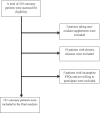The association between dietary patterns with severity of coronary artery stenosis, serum leptin-to-adiponectin ratio, and some related risk factors in patients with coronary artery disease
- PMID: 34178860
- PMCID: PMC8212295
- DOI: 10.1007/s40200-021-00801-7
The association between dietary patterns with severity of coronary artery stenosis, serum leptin-to-adiponectin ratio, and some related risk factors in patients with coronary artery disease
Abstract
Background: This research aimed to investigate the association between dietary patterns with severity of coronary artery stenosis, serum leptin-to-adiponectin ratio, and some related risk factors in patients with coronary artery disease referred for coronary angiography.
Methods: This cross-sectional study was carried out on 191 men patients with known coronary disease aged 40-70 years whom were admitted to angiography ward of Ahvaz teaching hospital, Ahvaz, Iran. Dietary patterns were investigated using 161-item semi-quantitative food frequency questionnaire. Anthropometric indices; blood pressure; serum levels of adiponectin and leptin, blood levels of glucose, total cholesterol, HDL-C, LDL-C, and triglycerides were measured. Patients were categorized based on the severity of coronary artery disease [number of vessel involved-single (VD1), double (VD2), triple (VD3)].
Results: Three major dietary patterns were recognized using a factor analysis approach: western, healthy, and traditional patterns. Linear regression analysis demonstrated that there was a negative association between healthy dietary pattern with LDL-C, total cholesterol, and triglycerides. This dietary pattern was positively related to HDL-C. Both traditional and western dietary patterns were related to fasting blood glucose level and lipid profile. General obesity was positively associated with traditional and western dietary patterns. There was a positive relationship between central obesity with traditional and western dietary patterns, but a negative association was reported between the healthy dietary pattern and central obesity. Traditional and western dietary patterns demonstrated a significant positive relationship with serum leptin levels and ratio of L/A, and an inverse relationship with adiponectin. Healthy dietary pattern had a significant negative association with serum leptin levels and ratio of L/A. Healthy dietary pattern was negatively related to the severity of vessel stenosis. Patients in the third quartile of healthy dietary pattern were less likely to have vessel stenosis (OR = 43%, 95% CI: 0.07-0.87).
Conclusions: The findings show that adherence to a healthy dietary pattern was negatively associated with coronary artery stenosis and its related risk factors. However, adherence to western and traditional dietary patterns was positively related to coronary artery disease risk factors.
Keywords: Adiponectin; Coronary artery disease; Coronary artery stenosis; Dietary pattern; Leptin; Risk factor.
© Springer Nature Switzerland AG 2021.
Conflict of interest statement
Competing interestsNone.
Figures
Similar articles
-
Association between dietary patterns and serum leptin-to-adiponectin ratio in apparently healthy adults.J Am Coll Nutr. 2015;34(1):49-55. doi: 10.1080/07315724.2014.880389. Epub 2015 Feb 3. J Am Coll Nutr. 2015. PMID: 25648370
-
Gender Differences in Major Dietary Patterns and Their Relationship with Cardio-Metabolic Risk Factors in a Year before Coronary Artery Bypass Grafting (CABG) Surgery Period.Arch Iran Med. 2016 Jul;19(7):470-9. Arch Iran Med. 2016. PMID: 27362240
-
Association between plasma leptin/adiponectin ratios with the extent and severity of coronary artery disease.BMC Cardiovasc Disord. 2020 Nov 4;20(1):474. doi: 10.1186/s12872-020-01723-7. BMC Cardiovasc Disord. 2020. PMID: 33148166 Free PMC article.
-
Serum concentration of adipocytokines in prepubertal vegetarian and omnivorous children.Med Wieku Rozwoj. 2011 Jul-Sep;15(3):326-34. Med Wieku Rozwoj. 2011. PMID: 22006488
-
Examining associations between dietary patterns and metabolic CVD risk factors: a novel use of structural equation modelling.Br J Nutr. 2016 May;115(9):1586-97. doi: 10.1017/S0007114516000556. Epub 2016 Mar 2. Br J Nutr. 2016. PMID: 26931638
Cited by
-
Interaction between CETP Taq1B polymorphism and dietary patterns on lipid profile and severity of coronary arteries stenosis in patients under coronary angiography: a cross-sectional study.Nutr J. 2023 Dec 14;22(1):70. doi: 10.1186/s12937-023-00899-w. Nutr J. 2023. PMID: 38098040 Free PMC article.
-
Hyperleptinemia results in systemic inflammation and the exacerbation of ischemia-reperfusion myocardial injury.Heliyon. 2021 Nov 26;7(11):e08491. doi: 10.1016/j.heliyon.2021.e08491. eCollection 2021 Nov. Heliyon. 2021. PMID: 34901513 Free PMC article.
-
Interaction of dietary patterns with rs28362491 on severity of coronary artery stenosis in patients undergoing coronary angiography.Sci Rep. 2023 Sep 5;13(1):14608. doi: 10.1038/s41598-023-41438-1. Sci Rep. 2023. PMID: 37669998 Free PMC article.
References
-
- Sarutipaiboon I, Settasatian N, Komanasin N, Kukongwiriyapan U, Sawanyawisuth K, Intharaphet P, Senthong V, Settasatian C. Association of Genetic Variations in NRF2, NQO1, HMOX1, and MT with Severity of Coronary Artery Disease and Related Risk Factors. Cardiovasc Toxicol. 2020;20(2):176–189. doi: 10.1007/s12012-019-09544-7. - DOI - PubMed
-
- Oikonomou E, Psaltopoulou T, Georgiopoulos G, Siasos G, Kokkou E, Antonopoulos A, Vogiatzi G, Tsalamandris S, Gennimata V, Papanikolaou A, Tousoulis D. Western Dietary Pattern Is Associated With Severe Coronary Artery Disease. Angiology. 2018;69(4):339–346. doi: 10.1177/0003319717721603. - DOI - PubMed
LinkOut - more resources
Full Text Sources


